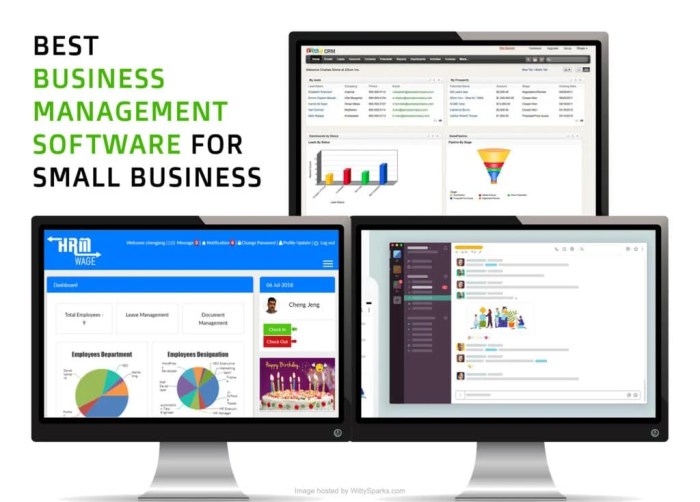Small business management software is essential for modern entrepreneurs seeking efficiency and growth. These powerful tools integrate various business functions, allowing small businesses to streamline operations, enhance productivity, and ultimately achieve better outcomes. Whether it’s accounting, project management, or customer relationship management, the right software can transform how businesses operate and compete in today’s fast-paced market.
These software solutions come packed with features that not only simplify daily tasks but also offer insights into performance metrics and team collaboration. From tracking expenses to managing client interactions, small business management software provides a cohesive approach to handling business needs, making it a crucial investment for any small enterprise aiming for success.
Introduction to Small Business Management Software
Small business management software is a collection of tools designed to help small businesses streamline their operations, manage resources, and enhance productivity. These software solutions are crucial for efficiency, enabling businesses to automate routine tasks and focus more on strategic growth. With features tailored to the needs of small enterprises, they can simplify processes and improve overall performance.
Key features of small business management software typically include project management, accounting, customer relationship management (CRM), and inventory management. By integrating these functionalities, such software provides a holistic view of business operations, enabling better decision-making and optimized workflows. Implementing such software can significantly benefit small businesses by reducing manual errors, enhancing communication, and facilitating data-driven strategies.
Types of Small Business Management Software
There are several categories of small business management software, each serving a specific function to improve business operations. Understanding the various types can help businesses select the right tools for their needs.
- Accounting Software: Helps manage financial transactions, invoicing, and tax preparation. Examples include QuickBooks and FreshBooks.
- Project Management Software: Facilitates planning, executing, and monitoring projects. Popular options are Trello and Asana.
- Customer Relationship Management (CRM): Manages interactions with current and potential customers. Notable CRM software includes HubSpot and Salesforce.
When comparing functionalities, small businesses should consider factors such as ease of use, integration capabilities, and support options. Each software option presents unique advantages that can cater to specific operational needs.
Choosing the Right Software for Your Business
Selecting the appropriate software for a small business requires careful consideration of various factors. Budget constraints, the size of the business, and specific operational needs should guide the decision-making process.
A checklist for evaluating different software options might include:
- Cost of software and any hidden fees
- User-friendliness and learning curve for employees
- Compatibility with existing systems and processes
- Scalability for future growth
- Customization options to fit unique business needs
Scalability and customization are essential features, as they allow businesses to adapt the software to evolving requirements without the need for frequent replacements.
Implementation of Small Business Management Software

Implementing new management software can be a transformative process for small businesses. The initial steps usually involve assessing current processes, defining goals, and selecting the right software based on prior evaluations.
Training employees on the new system is crucial to ensure smooth adoption. It is advisable to create comprehensive training programs that include hands-on sessions, tutorials, and support resources. Additionally, best practices for data migration involve thorough planning, testing the migration process, and ensuring that data integrity is maintained throughout the transition.
Benefits of Using Small Business Management Software
The advantages of using small business management software are significant, particularly in terms of time savings. By automating repetitive tasks, employees can focus on higher-value activities, ultimately enhancing productivity.
Moreover, such software fosters better collaboration among team members by providing a centralized platform for communication and project tracking. Numerous businesses have reported measurable improvements post-implementation, such as reduced project completion times and increased customer satisfaction rates.
Challenges and Solutions in Software Adoption

Although adopting management software can bring numerous benefits, small businesses often face challenges during this transition. Common obstacles include employee resistance to change and technical difficulties during implementation.
To overcome resistance, businesses can involve employees in the selection process and clearly communicate the benefits of the new system. Addressing technical issues may require dedicated IT support, thorough testing of the software before full-scale implementation, and ongoing maintenance to resolve emerging problems efficiently.
Future Trends in Small Business Management Software

Emerging technologies are set to reshape the landscape of small business management software. Trends such as artificial intelligence (AI) and automation are expected to enhance functionalities, making software even more efficient in data analysis and decision-making.
As businesses continue to evolve, the integration of AI capabilities will likely become standard, enabling predictive analytics and personalized customer experiences. This evolution will ensure that small business management software remains a vital asset, adapting to the changing needs of businesses over the next few years.
Summary
In conclusion, the adoption of small business management software can significantly elevate a company’s operational efficiency and foster growth. By carefully selecting the right tools and implementing them thoughtfully, small businesses can overcome challenges, enhance team collaboration, and position themselves for future success. With technology continuously evolving, staying informed about trends in management software will ensure that businesses remain agile and competitive in an ever-changing landscape.